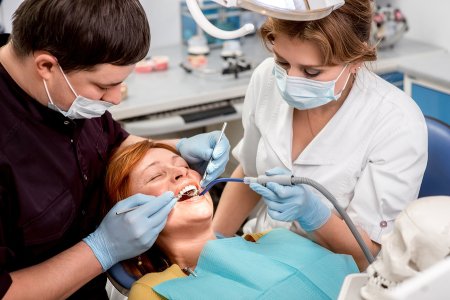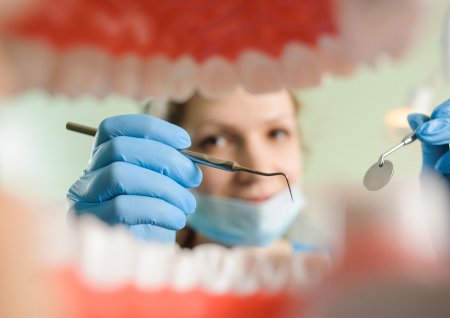-
What Are Dental Sealants?
Meticulous brushing and flossing are the backbones of preventive dentistry, along with routine check-ups at the dentist’s office. However, it can be challenging to clean well enough to prevent cavities, especially on the tops of the molars. The molars are the teeth that have large chewing surfaces, with lots of nooks and crannies. Dental sealants are a thin coating designed to protect these chewing surfaces from bacteria.

Essentially, the sealant material forms a barrier against food debris. This inhibits plaque formation. Most patients who receive dental sealants are kids and teens, but some adults may also benefit from them. It only takes a few minutes to apply a sealant, and it can last for years. At each subsequent dental exam, your dental sealants will be checked for signs of damage. The dentist can reapply the sealant whenever necessary.
Here at Glenwood Premier Dental, we’re committed to helping our patients achieve their healthiest, most beautiful smiles . Give us a call at (732) 264-4477 to request a dental exam in Hazlet.
-
Take a Look at a Routine Root Canal Treatment
Dentists can easily treat most cavities with a filling, provided the tooth decay hasn’t progressed too far. If the inner pulp of the tooth is diseased or damaged, a root canal is necessary. You can see a 3D animation of what happens during a root canal when you watch this featured video.
First, the dentist will drill a hole through the enamel to access the inner part of the tooth. The dentist then removes the diseased pulp, and replaces it with a filler material to strengthen the tooth. A temporary crown is placed over the tooth to protect it. You’ll return to the dentist’s office later to receive your permanent crown.
At Glenwood Premier Dental in Hazlet, root canals are one of our specialty services. Call (732) 264-4477 to schedule a consult with a dentist.
-
Steps to Take When You Lose a Crown
Dental restorations like crowns are bonded firmly to the natural tooth, but sometimes, physical trauma can knock them loose. It’s possible to lose a crown while playing sports. They can also be knocked out during car accidents and falls. A lost crown can be problematic because it’s needed to protect the remaining natural tooth. Without it, you may suffer from painful sensitivity. Call an emergency dentist promptly, and bring your knocked-out crown.
Manage your tooth sensitivity.
Never place aspirin directly on the oral tissues. Instead, manage your tooth sensitivity with clove oil , which is readily available in most supermarkets. Add a few drops of clove oil to a sterile cotton swab, and gently dab it on the area. Avoid breathing through your mouth, as this introduces temperature fluctuations to the sensitive area. If you’re thirsty, try to drink room temperature beverages, and if you eat before you see the dentist, avoid chewing on the affected side of your mouth.

Try to place the crown back on.
It may be possible to temporarily place the crown back over the remaining tooth. Clean the crown, dry it completely, and apply a little dental cement to the inside. Make sure the crown is positioned correctly before pressing it over the tooth. Like clove oil, dental cement is usually available in supermarkets, or you can check in a pharmacy. You’ll still need to see the emergency dentist as soon as possible, as over-the-counter dental cement won’t keep your crown in place for long.
Talk to your dentist about preventing recurrent crown loss.
Your dentist will examine the crown for damage. He or she will thoroughly sanitize the crown before bonding it firmly back in place. If you’ve lost the crown, you can receive a temporary restoration while awaiting a new one. Before you leave the dental office, ask about the reason for the incident. Sometimes, it might be obvious, such as if you were involved in a sports collision. Or, you might discover that you tend to grind your teeth without realizing it. Your dentist can recommend preventive solutions, such as a mouthguard.
Glenwood Premier Dental is here for you when you need an emergency dentist near Hazlet. Give us a call at (732) 264-4477, and we’ll see you as quickly as possible. Our dentists are proud to provide a comprehensive suite of services, including preventive and restorative care.
-
Learn the Different Types of Oral Cancers
Oral cancers are particularly devastating because, even if the patient survives, they can result in permanent facial disfiguration. Every individual should see a dentist at least every six months, but those who are at a high risk of oral cancer may benefit from more frequent check-ups. Oral cancer screenings can save lives.
Squamous Cell Carcinoma
Oral cancer can affect the lips, mouth, tongue, or throat. Most of the cancers diagnosed in the mouth and throat are squamous cell carcinomas. These cancers originate in the squamous cells, which are flat cells present in the lining of the throat and mouth.

Verrucous Carcinoma
Verrucous carcinoma is far less common than squamous cell carcinoma. It’s a slow-growing type of cancer that may develop at sites of chronic inflammation and scarring. For example, a person with bruxism who grinds the teeth and bites the inner cheeks during sleep may have chronic irritation and ulceration of the soft tissues. This type of oral cancer causes lesions that may be described as “cauliflower-like.”
Salivary Gland Carcinoma
The minor salivary glands are located throughout the throat and mouth lining. Several forms of cancer can originate here, including adenoid cystic carcinoma, polymorphous low-grade adenocarcinoma, and mucoepidermoid carcinoma. It’s also possible to develop cancer in the major salivary glands . There are three pairs of these glands: submandibular glands, located beneath the jawbone; sublingual glands, located beneath the tongue; and parotid glands. These last glands are located near each ear, and they give rise to most cases of major salivary gland cancers.
Basal Cell Carcinoma
Basal cell carcinoma can develop on the lip. Squamous cell carcinoma may also develop there. Lip cancers are often attributed to years of unprotected sun exposure. Lip cancer may be indicated by sores that refuse to heal, lip pain, and persistent swelling.
Glenwood Premier Dental encourages patients to have regular oral cancer screenings at our office in Hazlet. Our dentist uses specialized screening technology to detect potentially abnormal lesions that aren’t yet visible to the naked eye. Get in touch today at (732) 264-4477 to schedule a check-up.
